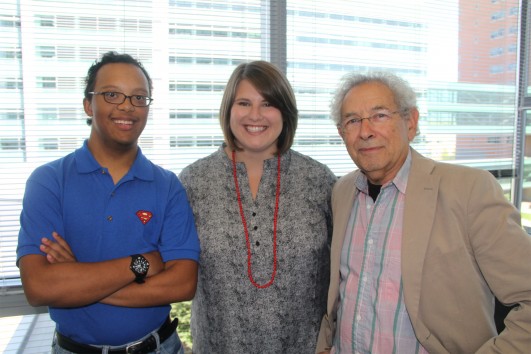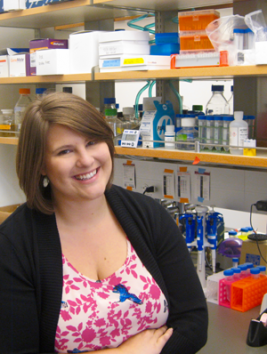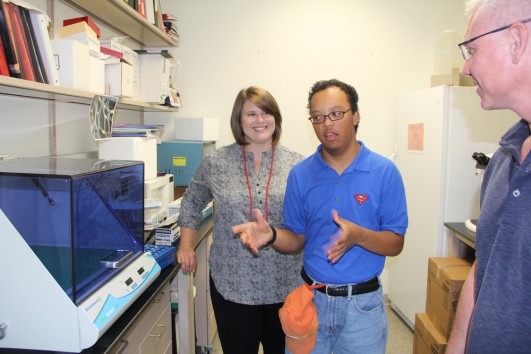First Crnic Institute Graduate Fellowship Awarded
Global donors ensure a pipeline of scientists researching Down syndrome — from undergrads and grad students to postdocs and senior investigators.
 Self-advocate Alan Beals, Amber Sorenson and Dr. Tom Blumenthal
Self-advocate Alan Beals, Amber Sorenson and Dr. Tom BlumenthalDr. Tom Blumenthal, the Executive Director of the Linda Crnic Institute for Down Syndrome, believes in Down syndrome research so much he invested his personal funds to establish a graduate fellowship award. Blumenthal, along with biopharmaceutical entrepreneurs and pioneers Joe Turner and Larry Gold provided a generous challenge grant to the Crnic Institute for this purpose. In a few short months, Global has succeeded in attracting 15 donations to match theirs – mostly from scientists.
Last week, the first Blumenthal Graduate Fellowship in Down Syndrome was awarded to Amber Sorenson. The fellowship is designed to create a pipeline of excellent investigators engaged in Down syndrome research. Candidates are evaluated on the strength of their proposed science and the likelihood such science will lead to improving outcomes for people with Down syndrome.
“We are amazed by the generosity of Tom, Joe and Larry,” said Michelle Sie Whitten, President & CEO of the Global Down Syndrome Foundation. “And of course they have now challenged us again to raise about $200,000 to create a Blumenthal Graduate Fellowship housed at the Anschutz Medical Campus!”
The current fellows are appointed to the University of Colorado Boulder’s Molecular, Cellular, and Developmental Biology (MCDB) Department – the department where Blumenthal, Turner and Gold all had appointments.
Blumenthal Graduate Fellowship in Down Syndrome Recipient Amber Sorenson
Amber Sorenson, a PhD student at the University of Colorado Boulder, received the first Blumenthal Graduate Fellowship in Down Syndrome. Chosen for her scientific excellence, Sorenson will use the grant to better understand how having three copies of chromosome 21 instead of two, which causes trisomy 21, or Down syndrome, influences genes globally. The fellowship will provide Sorenson with a salary and pay her tuition for a year, as well as provide extra funding for the genetic sequencing technologies she needs to conduct her research.

“We know the extra chromosome is tiny and has approximately 300 genes on it,” said Dr. Tom Blumenthal, Executive Director of the Linda Crnic Institute, Sie Chair in Genomics at the University of Colorado School of Medicine and a Professor at MCDB. “But now we want to know how those extra genes cause the activity of genes on all the other chromosomes to change, too. That’s what Sorenson will be studying. It’s a very exciting project.”
Sorenson works in the laboratory of Robin Dowell, Ph.D., Assistant Professor at MCDB and the BioFrontiers Institute at the University of Colorado Boulder. Dr. Dowell is a recipient of a 2013 and 2014 Crnic Institute Grand Challenge Grant. Dr. Dowell focuses primarily on how the extra copy of chromosome 21 affects cells on the molecular level, and she’s researching this by looking at how cells transcribe, or read, DNA, which may explain whether the physical and intellectual anomalies people with Down syndrome experience are caused by the extra copy of chromosome 21 or by something else.
“There are a lot of differences between any two people, whether they have Down syndrome or not, and the challenge is figuring out when an observed difference between an individual with Down syndrome and a typical individual is just normal variation,” Dr. Dowell said. “For example, I’ve got insomnia and type 2 diabetes. Is the insomnia related to the diabetes, or do I just happen to have two independent, unrelated conditions that each occur with some frequency throughout the general population?”
Sorenson will take that research to a more granular level, Dr. Dowell said. Her project will focus on understanding how the extra copy of chromosome 21 influences certain DNA binding proteins.
“These proteins control what is read out from someone’s DNA and when that happens,” Dr. Dowell said. “The extra copy of chromosome 21 creates an imbalance between the two, and Sorenson is studying that system.”
Improving the Lives of People with Down Syndrome
During her early years of college, Sorenson became interested in genetics research and, in particular, how abnormal chromosome development influences organisms at the global level. That eventually grew into an interest in Down syndrome.
“Right now, the Down syndrome research field is very heavily focused on chromosome 21 but lacks a broader look at the global changes caused by the extra chromosome,” Sorenson said. “The more we can learn about how genes are regulated and what changes result from trisomy 21, the more we’ll know about how we can reverse some symptoms and alleviate some of the problems people with Down syndrome have. Developing a better understanding of that will lay the foundation for future research.”
Making Scientific Progress
The reality is that conducting biomedical research is increasingly expensive and requires a great deal of financial resources, Dr. Blumenthal noted. The Blumenthal Graduate Fellowship is now part of the funding opportunities available for Down syndrome research including the Undergraduate Scholarships, the Crnic Institute Grand Challenge Grants, and the Sie Post-Doctoral Fellowship Program at the BioFrontiers Institute.

Dr. Blumenthal is excited about the future of Down syndrome research. “We’re suddenly able to track this extra chromosome, where we weren’t before,” Dr. Blumenthal said. “It’s a matter of putting good money behind good science.”
About the Linda Crnic Institute for Down Syndrome
The Linda Crnic Institute for Down Syndrome is the first medical and research institute with the mission to provide the best clinical care to people with Down syndrome, and to eradicate the medical and cognitive ill effects associated with the condition. Established in 2008, the Crnic Institute is a partnership between the University of Colorado School of Medicine, the University of Colorado Boulder, and Children’s Hospital Colorado. Headquartered on the Anschutz Medical Campus in Aurora, the Crnic Institute includes the Anna and John J. Sie Center for Down Syndrome at Children’s Hospital Colorado. It partners both locally and globally to provide life-changing research and medical care for individuals with Down syndrome. The Crnic Institute is made possible by the generous support of the Anna and John J. Sie Foundation, and relies on the Global Down Syndrome Foundation for fundraising, education, awareness and government advocacy. It is a research and medical-based organization without political or religious affiliation or intention.
To help fund the important Down syndrome research being done at the Crnic Institute and the University of Colorado Boulder please visit our donation page.
Recent Posts
- GLOBAL LEADERS – An Exclusive Interview with Erin Suelmann, Executive Director of the Down Syndrome Association of Greater St. Louis
- Sleep Apnea Across the Lifespan in People with Down Syndrome
- Government Profiles: Robert Aderholt (R-AL) & Tammy Baldwin (D-WI)
- Connor Long & Josh Peck: A GLOBAL Bromance
- GLOBAL Launches Pilot Fitness Program using Mann Method PT

 Experience our inspirational and groundbreaking videos and photos. Our children and self-advocates are beautiful AND brilliant!
Experience our inspirational and groundbreaking videos and photos. Our children and self-advocates are beautiful AND brilliant! Make sure your local Representatives are on the Congressional Down Syndrome Task Force.
Make sure your local Representatives are on the Congressional Down Syndrome Task Force.